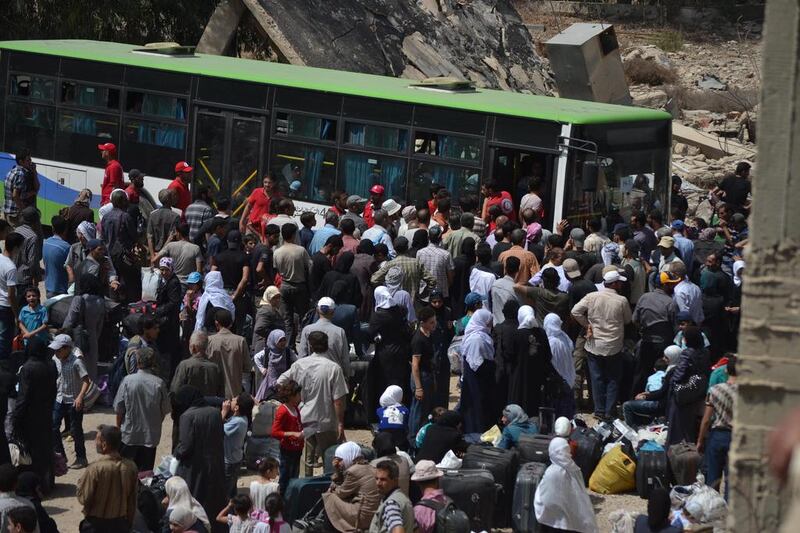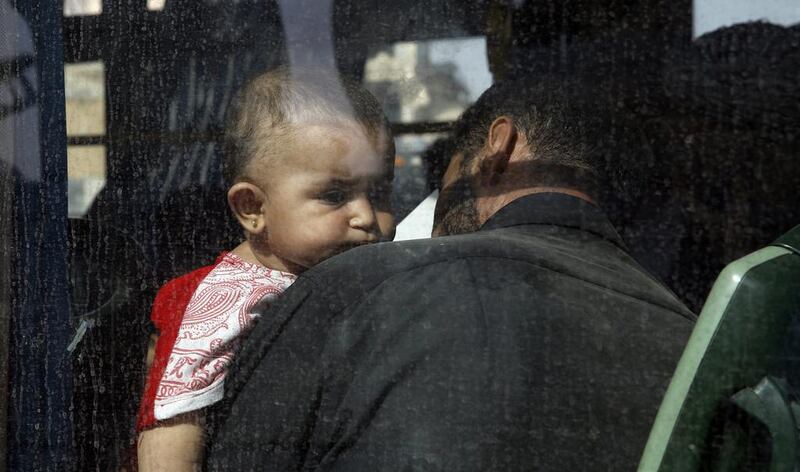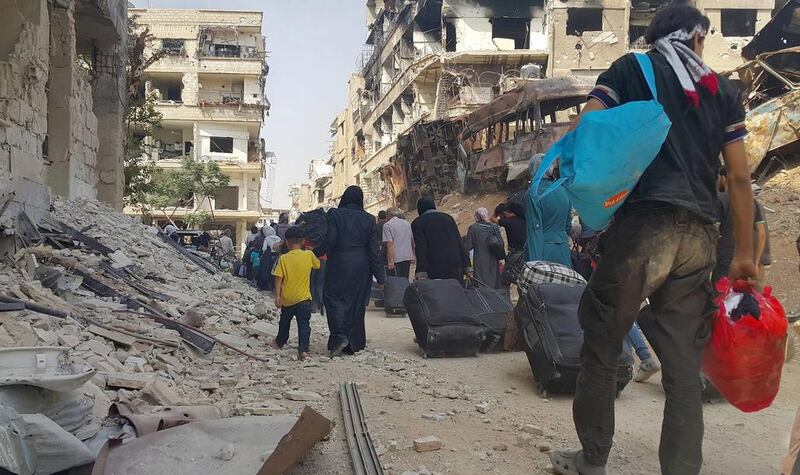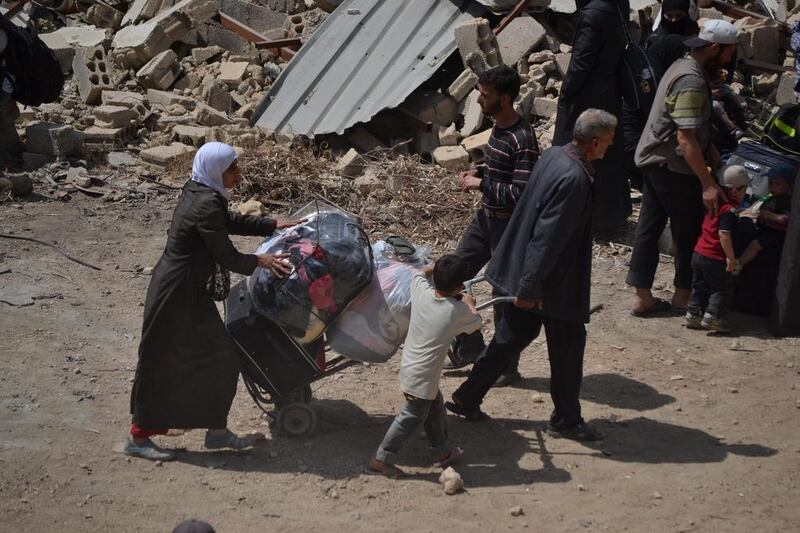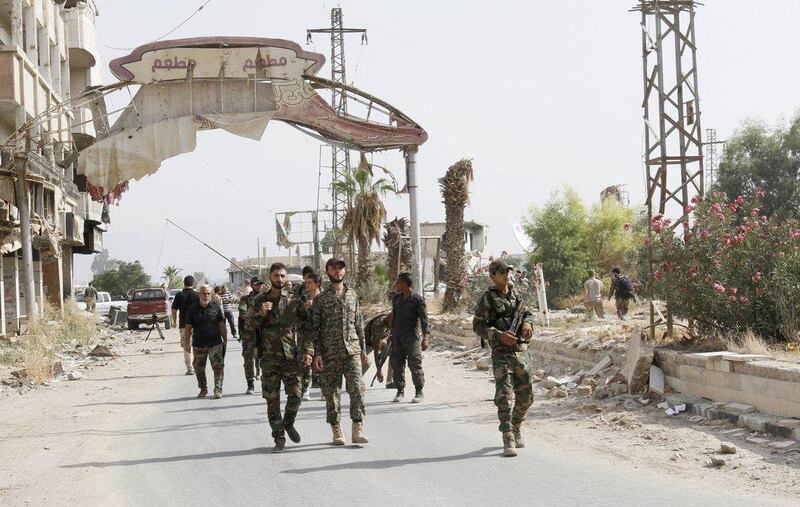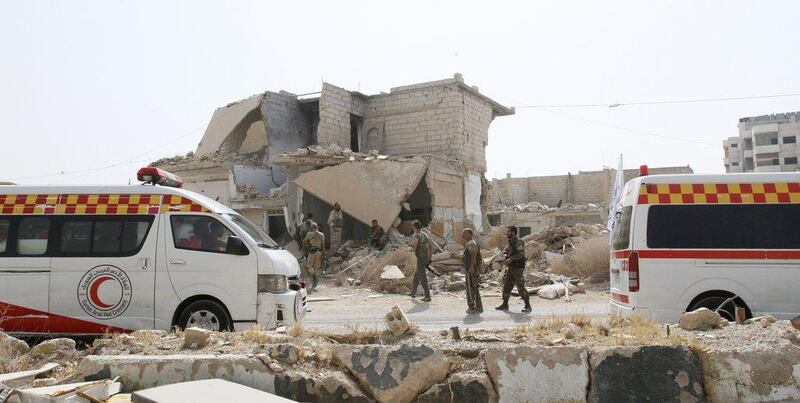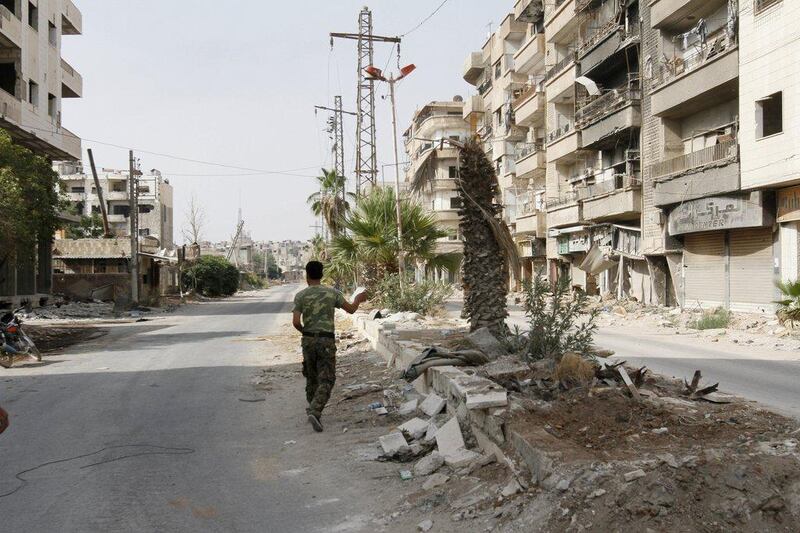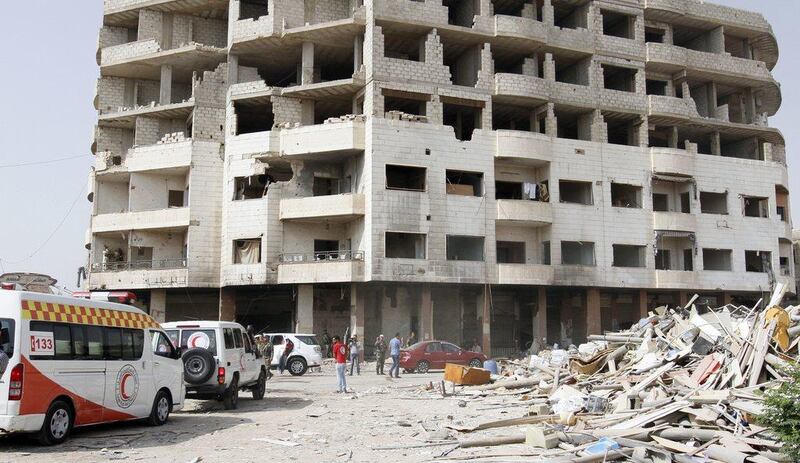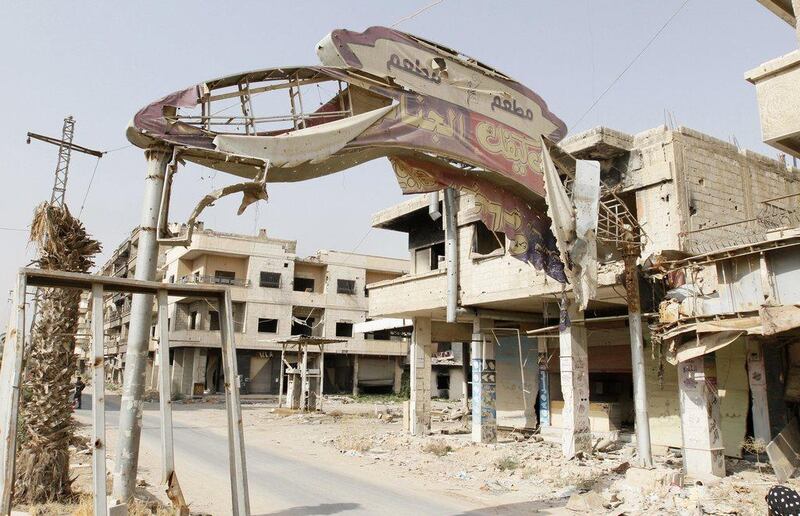DARAYA // Rebels and civilians, many in tears, began evacuating the Syrian town of Daraya on Friday after a four-year siege, by the Syrian army
At least 48 green and white buses, eight ambulances and several Red Crescent and UN vehicles stood ready at first light, waiting for the signal to drive into the Damascus suburb which now lies in ruins.
The evacuation is a blow to the opposition, which struck a deal with president Bashar Al Assad’s government. Daraya, which lies in the countryside south-west of Damascus, was one of the first towns to rise up against the regime, but paid heavily for it with four years of siege that brought many close to starvation.
Some 300 opposition fighters and their families left the devastated town aboard buses escorted by ambulances and Red Crescent vehicles. The first bus to emerge from Daraya carried mostly children, elderly people and women.
Government troops waved their weapons in celebration when buses carrying rebels left the town, and taunted the fighters by chanting pro-regime slogans.
Inside Daraya, which has been surrounded by loyalist forces since 2012 and suffered constant bombardment, tearful residents said their final goodbyes. “This is the hardest moment, everyone is crying, young and old,” said one resident.
The United Nation’s humanitarian chief Stephen O’Brien told the Security Council earlier this year that severe food shortages were forcing some people in Daraya to eat grass. Residents had described burning plastics to make fuel.
“No one will remain” here, said Hussam Ayash, a Daraya activist. “We are being forced to leave, but our condition has deteriorated to the point of being unbearable.”
Mr Ayash said the situation became unbearable after the town’s remaining field hospital was bombed and destroyed last week. The government had in recent months also encroached on the town’s farms – the only source of food for the suburb, which he estimated is home to 8,000 people. We withstood for four years but we couldn’t any longer,” he said, his voice breaking.
The evacuation is expected to last until Sunday, when the army will enter Daraya, according to military sources.
There was, however, some confusion over where the evacuees were being taken. State news agency Sana said 700 rebels and their families would go to rebel-controlled Idlib and thousands of civilians would be taken to government reception centres.
A rebel official said the civilians would go to regions under regime control around the capital and rebels will go to Idlib “or sort out their situation with the regime”. And Daraya council said on Facebook that fighters and their families would be escorted by the Red Crescent to northern Syria, civilians would be taken to the government-held town of Hrajela in Western Ghouta, outside Damascus, and from there would be free to go wherever they wished.
The UN said it was not involved in negotiating the deal, although a UN team would enter Daraya to identify civilian needs.
UN envoy Staffan de Mistura said it was “tragic that repeated appeals to lift the siege of Daraya ... and cease the fighting, have never been heeded”.
It was “imperative” that its residents be protected and evacuated only voluntarily, adding: “The world is watching.”
Daraya is just 15 minutes drive from Damascus and even closer to the government’s key Mazzeh airbase. It was a symbolic bulwark of the Syrian uprising in March 2011, which began with peaceful protests against president Al Assad’s government, before degenerating into a war that has killed more than 290,000 people. Rebels accused the government of killing some 500 people in a military operation in Daraya in August 2012.
Friday’s evacuation provoked anger and bitterness among opposition supporters, and the rebel official said residents wept as they prepared to leave.
“People are saying goodbye to one another, children are bidding their schools farewell, mothers are saying goodbye to the martyrs in the graves,” he said.
“People are gathering their memories and the few possessions they have left to preserve the memory of the four years of siege, hunger and shelling.”
The rebel said the decision to evacuate had been taken because of deteriorating humanitarian conditions.
“The town is no longer inhabitable, it has been completely destroyed,” he said.
In four years, only one food aid convoy had entered Daraya, in June, shortly after a convoy carrying medicine. The arrival of the food followed by heavy bombardment by the Syrian army which brought distribution to halt.
According to the UN, nearly 600,000 live under siege across Syria, most surrounded by government forces, although rebels and extremists also use the tactic.
Long sieges have forced rebels in several locations to agree evacuation arrangements with the government, which has prompted activists to accuse Damascus of using “starve or surrender” tactics.
In Geneva, US secretary of state John Kerry and Russian foreign minister Sergei Lavrov met to discuss how to resume Syrian peace talks, with Mr De Mistura briefly joining them.
Asked before the meeting which was the main impediment to a broader nationwide ceasefire, Mr Lavrov replied: “I don’t want to spoil the atmosphere for the negotiations.” Asked during a break how the meeting was proceeding, Mr Lavrov said: “Excellent.”
One focus of the talks was a US government proposal to coordinate with Russia on air strikes against ISIL and other Syrian rebel groups that the two countries agree are terrorists. Russia would use its influence to persuade president Al Assad to ground his air force and uphold a ceasefire. America would in turn share intelligence with Russia for strikes against extremist groups.
Mr De Mistura had voiced hope of bringing the warring parties back to the negotiating table by the end of August, but with intense fighting continuing on the ground, that deadline will certainly not be met.
As the Geneva meeting got under way, Russian president Vladimir Putin and his Turkish counterpart, Recep Tayyip Erdogan, agreed to step up efforts to ensure humanitarian aid reaches civilians in the battlefront northern city of Aleppo.
Moscow and Washington back opposing sides in the Syria war.
*Associated Press and Agence France-Presse
